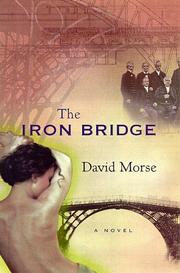Check nearby libraries
Buy this book

In Shropshire, England, 1773, important men are planning the world's first iron bridge, to be built across the Severn River at Coalbrookdale. John Wilkinson, armsmaker, wants the bridge: let it serve as a symbol and advertisement for iron. Abraham Darby III, owner of the largest iron-works in England and a Quaker, wants the bridge: let it further his family name. Thomas Farnolls Pritchard, architect, wants the bridge: let it be the capstone of his career.
Maggie Foster, too, wants the bridge built - but built wrong this time. If she can get Darby to use a different design, the bridge will topple in the next earthquake. Iron will be discredited, the Industrial Revolution postponed. Then history may take a path better than the one that has made a ruin of the world she comes from. Maggie was sent by Ecosophia, a desperate commune in the United States, in the Southwest, in the year 2043.
Check nearby libraries
Buy this book

Previews available in: English
Showing 1 featured edition. View all 1 editions?
| Edition | Availability |
|---|---|
| 1 |
aaaa
Libraries near you:
WorldCat
|
Book Details
Edition Notes
Classifications
The Physical Object
ID Numbers
Source records
Scriblio MARC recordCollingswood Public Library record
Library of Congress MARC record
Internet Archive item record
Library of Congress MARC record
Better World Books record
marc_nuls MARC record
marc_columbia MARC record
Work Description
An exciting debut novel, David Morse's The Iron Bridge bears more than a passing resemblance in premise to Connie Willis's award-winning time-travel tales, Doomsday Book and To Say Nothing of the Dog. The common idea: a young, slightly confused person tries to get a seemingly simple task accomplished in the distant past, only to find out that life then was easily as chaotic as life now, and that her task won't be so simple. Morse departs from Willis's path in that his heroine, Maggie Foster, is beamed back to 1773 England from a decidedly dystopian future in which rampant industrial growth has resulted in ecological collapse. If Maggie can spoil the success of the world's first iron bridge, then the industrial revolution--and humanity's ecological record of shame--may be prevented. The Iron Bridge is melancholy and thoughtful, focusing on the worries and passions of Maggie and the ironworking Quaker family she becomes attached to. Maggie's dilemma is tough--everyone wants the bridge built well, including the people she comes to care about. If she fails, the course of history will lead to ecological disaster; if she succeeds, her loved ones in the future will cease to have existed, and her adopted family will be ruined. --Therese Littleton
Community Reviews (0)
Feedback?| July 13, 2024 | Edited by MARC Bot | import existing book |
| March 8, 2023 | Edited by MARC Bot | import existing book |
| October 8, 2021 | Edited by ImportBot | import existing book |
| November 26, 2020 | Edited by MARC Bot | import existing book |
| December 10, 2009 | Created by WorkBot | add works page |









